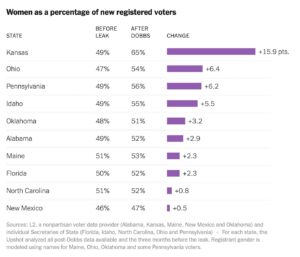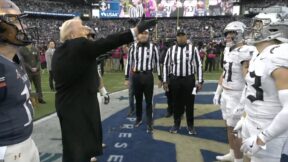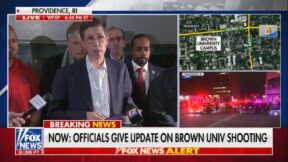Multiple States Saw Surge of Women Registering to Vote Post-Dobbs, Especially Kansas, Where Voters Just Rejected a Referendum to Ban Abortion
Multiple states saw a surge in women registering to vote after the Supreme Court’s decision in Dobbs v. Jackson Women’s Health Organization, most of all Kansas, where voters defeated a ballot referendum that would have effectively banned abortion in the state.
American Voices host Alicia Menendez discussed the voting trend with her guests Saturday, former Reps. Debbie Mucarsel-Powell (D-FL) and David Jolly (R-FL)
The trend in new voter registrations was reported in a New York Times article this week that reviewed voter data in ten states in the aftermath of the Dobbs decision, which overturned the landmark abortion case of Roe v. Wade. The states that were analyzed included Kansas, Pennsylvania, Ohio, Oklahoma, Florida, North Carolina, Idaho, Alabama, New Mexico, and Maine.
Among the ten states covered by the study, the Times reported that some showed “a pronounced surge in the share of new registrants who were women and others showing little change at all.”
Overall, “[t]he total number of women registering to vote in those states rose by about 35 percent after the decision, compared with the month before the leak,” and an “uptick of 9 percent” for men in the same period.

Screenshot via New York Times.
The increase in new women voters was “most pronounced” in Kansas, which had that abortion referendum on the ballot for its primary election earlier this month. According to the Times, more than 70 percent of Kansas’ newly registered voters were women during the week after the Dobbs decision, and “[a]n unusually high level of new female registrants persisted all the way until the Kansas primary this month, when a strong Democratic turnout helped defeat a referendum that would have effectively ended abortion rights in the state.”
The overall numbers, and especially the Kansas data, add “rare concrete evidence” to the anecdotal evidence that the Supreme Court’s abortion ruling is motivating women voters, but it’s not clear if it will be significant enough of a bump or sustainable through November in order to affect the midterm elections.
Menendez asked Muscarsel-Powell for her thoughts on the Times report, with women flipping around past trends and now outpacing men registering to vote.
“I’m of the belief,” said the MSNBC host, “that this is not just a woman’s issue. That this is an economic issue, it’s a motivating issue for a lot of voters, but clearly, very clearly, women are coming out and getting prepared to show up in the midterms.”
The former congresswoman agreed with Menendez, replying that “democracy and women’s rights go hand-in-hand” and noting that Gov. Ron DeSantis (R-FL) was supporting an abortion ban without exceptions for rape and incest.
“This is about our privacy, this is about our right to choose,” Muscarsel-Powell continued. “It is a private matter between women, their family, and God. And I can tell you that it resonates for Republican women, for Democratic women, for independent women. No one, especially government, should not be telling us how to live our lives.”
She added that even in “conservation nations, extremely religious nations” in Latin America, women had “formed a movement” and been able to get laws passed making abortion legal. “Women came together,” she said, “especially because it’s a matter of being able to be independent economically.”
Muscarsel-Powell said that the trend was a “very positive thing” for the Democrats. “I have been talking to a lot of women here in the state of Florida,” she said, “and they are registering, they are ready to come out and vote, and it is going to be a resonating vote against Ron DeSantis in November.”
“Fascinating, that comparison to Latin America,” said Menendez.
Watch the video above, via MSNBC.




